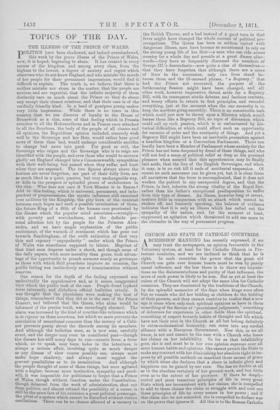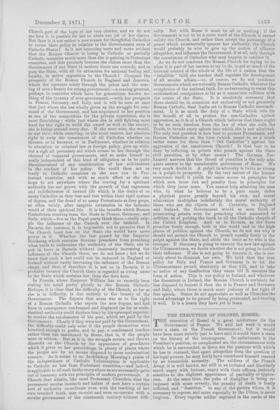CHURCH AND STATE IN CATHOLIC COUNTRIES.
RCHBISHOP MANNING has recently expressed, if we may trust the newspapers, an opinion favourable to the Voluntary system, at least for the Catholic Church in Pro- testant countries, and we are inclined to think that he is
light. In such countries the power that the great old Church can gain over human hearts must be won by purely moral influence, and the less there is to throw any imputa- tions on the disinterestedness and purity of that influence, the more of such power is likely to be won. But as yet at least the rulers of the Church will not adopt the same idea for Catholic countries. They are dominated by the traditions of the Church, by the splendid memories of the days when kings were often, but as vassals who did her bidding as children do the bidding of their parents, and they cannot contrive to realize that a new age is come when only such spiritual opinions as have in them something of the flavour of "provisional judgments," something of deference for experience in other fields than the spiritual, something of respect towards habits of thought and life which have not their root in the Church at all but belong definitely to extra-ecclesiastical humanity, can enter into any cordial alliance with a European Government. Now this, as we all know, is not and cannot be the case with a Church who bases her claims on her infallibility. So far as that infallibility goes, she is and must be in her own opinion supreme over all mere human habits and opinions. She cannot permit the State to make any contract with her diminishing her absolute right to im- press by all possible methods on mankind those means of grace by which alone she declares that a share in infinite glory and happiness can be gained by our race. She has no doubts at all as to the absolute certainty of her ground-work, and but little even as to the extent of her province. If. there be deeply.. rooted and most tenacious principles of hfe in every great State which are inconsistent with her claims, she is compelled to add to these claims the claim to struggle with and root out those principles of life by every means in her power ; and if this claim also be not conceded, she is compelled to declare war on the power that ignores it. All this is to the Roman Catholia Church part of the logic of her very charter, and we do not see how it is possible for her to abate one jot of her claims. But then is it not rather a new reason for thoughtful Catholics to revise their policy in relation to the Governments even of Catholic States ? Is it not becoming more and more evident that the Roman Church is losing in Catholic or partially Catholic countries much more than she is gaining in Protestant countries, and this precisely because she claims more than the Government of any State in modern times can concede, and so puts the State, with all its attraction for national feeling and loyalty, in active opposition to the Church ? Compare the prospects of the Roman Church in England and America, where she operates solely through the priest and the crav- ing of men's hearts for strong governments—a craving greatest, perhaps, in countries which have for generations known no- thing of the tyranny of over-government,—with her prospects in France, Germany, and Italy, and it will be seen at once that just where she has wholly given up the struggle for com- mand of the Government, and has acquiesced in her position as one of the competitors for the private conscience, she is most flourishing ; while just where she is still fighting most hard for the right to wield the sword as well as the crozier, she is losing ground every day. If she were wise, she would, in our view, while reserving, as he must reserve, her absolute right to sway the consciences of all Catholics whether on thrones, or in bureau; or in Parliament, whether in relation to education or criminal law or foreign policy, give up with- out a sigh all pecuniary aid which Comes to her through the channel of temporal governments, and so make herself so really independent of this kind of obligation as to be quite disembarrassed of any consideration of low self-interest in the conduct of her policy. She could then act as freely in Catholic countries as she now can in Pro- testant countries, and with as much effect as she can hope to act anywhere where the craving for a spiritual authority has not grown with the growth of that vagueness and indefiniteness of inward life which is the desire of so many Catholics as they toss and fret within their rigid system of dogma, and the dread of so many Protestants as they grope, so often vainly, after tangible certainties in the inchoate world of their spiritual life. It is the benefits which Roman Catholicism receives from the State in France, Germany, and Italy, which—few as the Papal party think them—really crip- ple the influence of the Church over the faithful. In Bavaria, for instance, it is impossible not to perceive that if the Church leant less on the State she would have more power in it. Whether the law passed by the Imperial Reichstag which restrains German preachers from preaching what tends to undermine the authority of the State, can be put in force in Bavaria without immensely increasing the influence of the Church there, we do not know ; but we do know that such a law could not be enforced in England or Ireland without vastly increasing the influence of the Roman clergy, and that, if therefore it is not so in Bavaria, it is probably because the Church there is regarded as owing more to the State which sustains her, than she does here.
In Prussia, where Emperor William has so recently been stating his mind pretty plainly to the Roman Catholic Bishops, it is clear that the difficulty of the Church, so far as she is in difficulty, is due entirely to the bounty of the Government. The dispute that arose was as to the right of a Roman Catholic who rejects the new dogma, and had been in consequence condemned and displaced (as far as eccle- siastical authority could displace him) by his episcopal superior, to receive the emoluments of his post, which are paid by the Government. Clearly if they were not paid by the Government, tho difficulty could only arise if the people themselves were heretical enough to prefer, and to pay, a condemned teacher rather than one sanctioned by Rome, that is, if the people were in schism. But as it is, the struggle occurs, and throws discredit on the Church by the appearance of greediness which it gives to her proceedings, in plenty of places where the people are by no means disposed to incur ecclesiastical censure. As it seems to us, Archbishop Manning's praise of the independence of Catholic Voluntaryism is applicable to Catholic no less than Protestant countries,—and indeed, is applicable to all such faiths everywhere as are necessarily quite out of harmony with the principles of modern government. A Church that admits, like most Protestant Churches, that the permanent secular instincts and habits of men have a certain sort of authority co-ordinate even with the teaching of her own revealed truth, may co-exist and even co-operate with a secular government of the nineteenth century without diffi-
culty. But with Rome it must be all or nothing ; if the Government is not to be a mere ward of the Church it cannot satisfy the Church, and rather then accept the patronage of a power which substantially ignores her authority, the Church would probably be wise to give up the notion of alliance altogether, and influence the Government, if at all, only through the consciences of Catholics who may happen to conduct it.
As we do not condemn the Roman Church for trying to do what it is part of her essence to try to do, to get so much of the internal control of the whole of the life of a nation that the "infallible "faith she teaches shall regulate the development of all secular affairs,—so, of course, we do not condemn Governments which are no t really Roman Catholic, whatever the complexion of the national faith, for endeavouring to resist this ecclesiastical omnipotence so far as it comes into collision with the action of the State. It is absolutely necessary that there should be, in countries not exclusively or not genuinely Roman Catholic, final limits set to Roman Catholic encroach- ment. It is as much the duty of a State which acts for the benefit of all to protect the non-Catholics against aggression, as it is of a Church which believes that there ought to be no such freedom from the law of what she calls the Truth, to invade every sphere into which she is not admitted. The only real question is how best to protect Protestants, and Roman Catholics on the turn (which seems to us a much better name for them than " Old Catholics ") against the aggression of the omnivorous Church ? Is that best to be done by inflicting on priests who preach against the State
civil penalties, or by other means The German Par- liament answers that the threat of penalties is the only ade- quate answer to the unendurable pretensions of Rome. We very much doubt it. A pulpit in adversity is twice as strong as a pulpit in prosperity. By the very nature of the human conscience itself, it yields far easier access to principles for which men incur risk and penalty than to principles for which they incur none. You cannot help admiring the man who, in what he believes to be a pure cause, defies a physical power greatly beyond his own, and moral admiration multiplies indefinitely the moral authority of those who are the objects of it. Certainly, in England and Ireland, the Government would as soon think of prosecuting priests even for preaching what amounted to sedition, as of putting the torch to all the Catholic chapels of the United Kingdom. And so in Bavaria, as the State preaches freely enough, both in the world and in the high places of politics, against the Church, we do not see why it should not permit the Church to preach equally freely in the pulpit against the State, and abide the issue as to who is the stronger. If Germany is going to execute the new law against the Ultramontanes, we doubt whether she is not going to double their influence. If she is not going to execute it, she is cer- tainly about to diminish her own. We hold that the true policy for Italy and France and Germany is to let the Ultramontanes preach absolutely as they will, and to take no notice of any disaffection they cause till it assumes the form of action. This is our policy in Ireland, and whatever the discontent in Ireland, the Roman Church is certainly far less disposed to foment it than she is in France and Germany and Italy, where there is much more jealousy of her right of free speech. States do not appreciate so well as Churches the moral advantage to be gained by being persecuted, and bearing, it well. It is a lesson they have yet to learn.



































 Previous page
Previous page